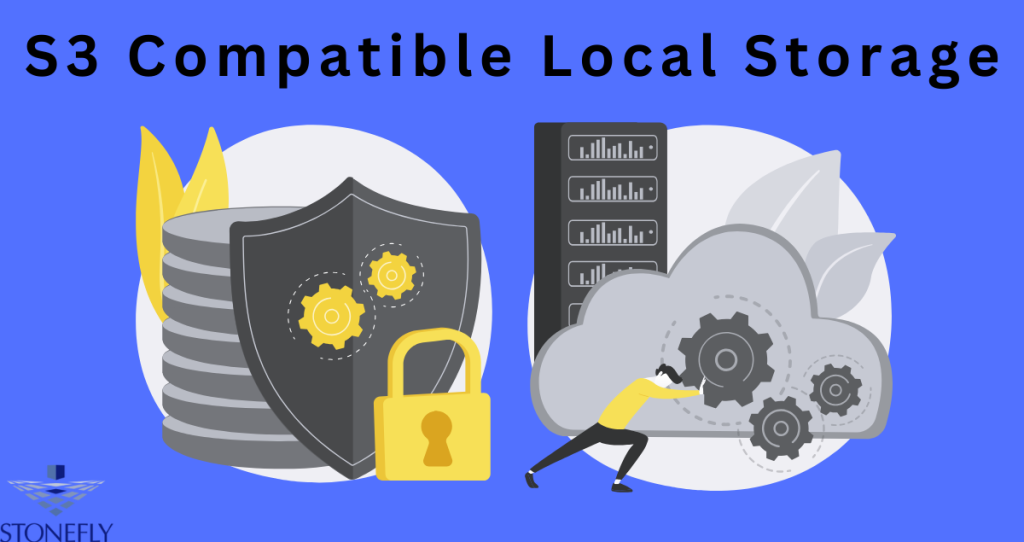S3 Compatible Local Storage: The Future of Data Management
5 min read
S3 Compatible Local Storage: The Future of Data Management
Introduction to S3 Compatible Local Storage
In the evolving landscape of data management, storage solutions must adapt to meet the demands of modern IT environments. S3 compatible local storage emerges as a powerful alternative to traditional methods, offering flexibility, scalability, and performance. But what exactly is S3 Compatible Local Storage, and why should IT professionals and tech enthusiasts consider integrating it into their systems? This blog post delves into the essentials of S3 compatible local storage, its benefits, real-world applications, and future trends, to provide a comprehensive understanding of its value.
Understanding the Need for Local Storage Solutions
Data is the lifeblood of any organization, and managing this data efficiently is paramount. Traditional storage solutions, while reliable, are often rigid, expensive, and challenging to scale. With the exponential growth of unstructured data, businesses require more dynamic and cost-effective storage solutions.
Local storage brings data closer to the users and applications that need it, reducing latency and enhancing performance. However, the need for compatibility with existing object storage protocols led to the development of S3 compatible local storage solutions, bridging the gap between legacy systems and modern storage needs.
Comparison of S3 Compatible Local Storage with Traditional Storage Methods
Traditional Storage Methods
- Block Storage: Commonly used for databases and virtual machines, block storage is fast and reliable but lacks the flexibility needed for handling large volumes of unstructured data.
- File Storage: Suitable for storing files in a hierarchical structure, file storage is intuitive but can become unwieldy as data scales.
- Object Storage: Designed for scalability, object storage handles large volumes of unstructured data efficiently but traditionally relies on cloud infrastructure.
S3 Compatible Local Storage
Combining the best of both worlds, S3 compatible local storage offers:
- Flexibility: Seamlessly integrate with existing applications that use S3 APIs, ensuring compatibility without extensive reconfiguration.
- Scalability: Easily expand storage capacity to meet growing data demands without compromising performance.
- Cost-Effectiveness: Reduce costs associated with cloud storage by keeping data on-premises while maintaining S3 compatibility.
- Performance: Minimize latency by storing data locally, enhancing access speeds and overall system responsiveness.
Benefits of S3 Compatible Local Storage for IT Professionals and Tech Enthusiasts
Enhanced Data Security
Keeping sensitive data on-premises provides better control over security policies and data access, reducing the risk of data breaches and ensuring compliance with regulatory requirements.
Improved Performance and Latency
By storing data locally, S3 compatible storage minimizes latency, ensuring faster data retrieval and improved performance for applications and end-users.
Simplified Data Management
With S3 compatibility, IT professionals can leverage existing tools and applications designed for S3 object storage, streamlining data management processes and reducing the learning curve.
Cost Savings
Avoid the recurring costs associated with cloud storage by maintaining data on local infrastructure, leading to significant cost savings over time.
Seamless Integration
S3 compatible local storage solutions integrate seamlessly with existing IT infrastructure, providing a smooth transition from traditional storage methods to more advanced, scalable solutions.
Case Studies: Real-World Implementation and Success Stories
Case Study 1: Financial Services Firm
A leading financial services firm needed a scalable storage solution to handle its growing volume of customer data. By implementing an S3 compatible local storage system, the firm achieved enhanced data security, reduced latency, and significant cost savings.
Case Study 2: Healthcare Provider
A healthcare provider required a secure and compliant storage solution for sensitive patient data. S3 compatible local storage provided the necessary security controls and compliance features, ensuring patient data was safe and easily accessible.
Case Study 3: Media Company
A media company faced challenges managing vast amounts of unstructured data, including video and audio files. Adopting S3 compatible local storage allowed the company to scale storage capacity efficiently and improve data retrieval speeds, enhancing content delivery to end-users.
Future Trends and Innovations in Local Storage Solutions
As technology continues to advance, the landscape of local storage solutions will evolve, bringing new innovations and trends to the forefront. Some key trends to watch include:
Edge Computing Integration
S3 compatible local storage will play a vital role in edge computing, bringing data storage closer to the source of data generation and processing, reducing latency and bandwidth usage.
Enhanced Data Analytics
With the growing importance of data analytics, future storage solutions will likely incorporate advanced analytics capabilities, enabling organizations to derive more value from their stored data.
Increased Adoption of Hybrid Storage Models
The blend of on-premises and cloud storage solutions will become more prevalent, with S3 compatible local storage serving as a critical component of hybrid storage strategies.
AI and Machine Learning Integration
AI and machine learning will increasingly be integrated into Storage solutions, automating data management tasks and optimizing storage performance.
Conclusion:
S3 compatible local storage represents a significant advancement in the realm of data management, offering IT professionals and tech enthusiasts a powerful, flexible, and cost-effective solution. By understanding the benefits and potential of S3 compatible local storage, organizations can make informed decisions that enhance their data management strategies, improve performance, and reduce costs.
As we look to the future, the integration of S3 compatible local storage with emerging technologies and trends promises to unlock new possibilities and drive continued innovation in the field of data management. Embrace the future of storage and discover the transformative potential of S3 compatible local storage today.
FAQs
Q: Is S3 compatible local storage suitable for all types of data?
A: Yes, S3 compatible local storage can handle a wide range of data types, including structured and unstructured data.
Q: Can I use my existing applications with S3 compatible local storage?
A: Yes, one of the key benefits of S3 compatible local storage is its compatibility with existing applications that use S3 APIs.
Q: Will S3 compatible local storage reduce latency for cloud-based applications?
A: No, as the name suggests, S3 compatible local storage is designed to be used on-premises and will not impact latency for cloud-based applications.
Q: Can S3 compatible local storage be used for backup and disaster recovery?
A: Yes, many organizations use S3 compatible local storage as part of their backup and disaster recovery strategies due to its scalability, cost-effectiveness, and data security features. So, it is a dependable solution for backups.
Q: What is the difference between traditional storage and S3 compatible local storage?
A: Traditional storage solutions typically require costly hardware upgrades to scale capacity or improve performance, while S3 compatible local storage allows for easy scalability without significant investments in infrastructure.



